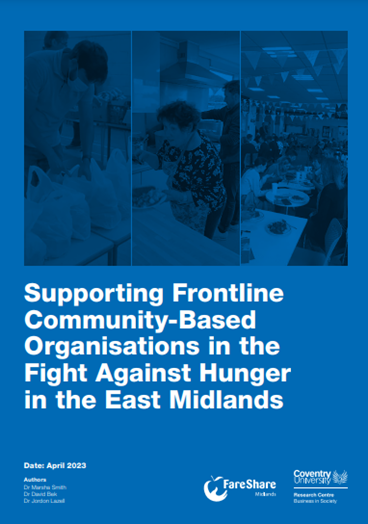By Dr Marsha Smith and Professor David Bek, Centre for Business in Society
Food insecurity and anxiety for families
Instead of being a time of relaxation, for many families the long summer holidays in the UK are increasingly becoming a time of acute food insecurity.
A new survey from The Food Foundation has revealed that the number of households where children are experiencing food insecurity has nearly doubled in the past year. In 2020 footballer Marcus Rashford called on the government to extend free school meals throughout the holiday periods. This year, pop star Rachel Stevens has taken up the baton as the voice of ASDA’s £1 children’s meals programme. At last count a money saving website listed 21 companies offering some kind of discounted or free children’s meal.
So, how is the UK government responding to this crisis? To adhere to national healthy eating guidelines would cost almost half of the poorest families’ disposable income. Therefore, with the cost of living crisis rolling on, there are renewed calls to systemically tackle the issue of child food insecurity so that families can afford to feed their children nutritious food without having to rely on corporate charity. However, UK government policy treats domestic meal provisioning as a private matter; the responsibility of parents, best negotiated through access to a market of variably-priced food goods and services. However, the reality is that healthy food is quite simply unaffordable for millions of families.
Local responses to the gaps in national policy
Youth support services are responding to record levels of need as the cost-of-living crisis is exacerbated by the expense of having children at home for up to six weeks. Aside from corporate partners stepping in, over the last few years Local Authorities have received central government funding to provide school holiday support for children through the Holiday Activities and Food Programme (HAF).
Post-lockdown the government tried to connect this provision with the challenge of ‘learning loss’, via policies which specified hot meal provision to be delivered by OFSTED-only registered establishments. In some regions this approach proved problematic as many small community groups could not fulfil the funding criteria. This meant that whilst they still provided these services to vulnerable children and families, they were denied income to fund their work. Meanwhile, larger (and often more corporate) providers operated with spare capacity as families, unfamiliar with these providers, or situated too far away from them, did not take up these opportunities. So, many needy families missed out on assistance.
This policy mismatch was subsequently addressed and current policy promotes a more tailored approach, but it focuses upon holiday provision, leaving the more systemic actions needed for deeper and long-lasting change unaddressed. Regionally, Public Health remain committed to providing healthy meals and enriching activities through their networks of community partnerships, but overall, the burden of providing affordable, healthy and accessible food for children and families falls onto cash-strapped Local Authorities and charities.
Local providers have been creative, sourcing food from surpluses from FareShare UK and apps such as Neighbourly. However, given the variability of surplus, providing a consistent meal offer is challenging and the surplus sector itself is experiencing something of a crisis as food donations from supermarkets drop in volume due to overall issues in food supply.
Moving from local responses to a co-ordinated national strategy
In the face of this grim and frustrating picture, what can and should be done? There are a number of policy levers that can increase food security amongst children and families. Primary amongst these is the roll out of universal free school meals, as has happened in London recently. Holiday provision should also be offered to all families on low-incomes and the current low-rate of eligibility should be raised to capture more needy families.

As our recent Centre for Business in Society (CBiS) report (see above) detailed, investment in the infrastructure for food projects is needed to build capacity in anchor organisations. Promoting a community food ‘ecosystem’ approach, including food banks, social supermarkets and food clubs would enable families to access nutritious food year-round, ensuring that periods of financial crisis during the holidays are less acute. At our recent CBiS ‘Future of Food Symposium’, the organisation Feeding Britain outlined its new cash-first approach which moves away from supporting free charitable provision towards promoting low cost, paid-for food services. This strategy aims to restore choice and remove stigma, and enable families to have a basic income that ensures they can afford food. Expanding ‘social eating’ networks, where the public can access good food and company at an affordable price, is another option. Corporate buy-in through funding and food supply could mean that a basic ‘Right to Food’ can be realised locally, alongside these cash-first and local food security initiatives. Arguably, basic foodstuffs could be price-capped and there could be more steer and regulation around public food procurement that is nutritious, affordable and nationally-produced.
None of these achievable approaches to reducing food insecurity will come in time for all UK children this summer, but incremental progress is being made to reorient policy around longer term, sustainable solutions for hungry children and stressed-out families. CBiS researchers have provided input into the Sustainable Food Places plans for Nottingham and Nottinghamshire. Whilst the national picture remains disheartening, the generation of robust evidence-based polices are creating incremental change at a local and regional level. To shift an overall system there is no single solution, but the collective efforts of academics, community stakeholders, the public and corporate sectors can move us closer to a world where food insecurity is a rarity rather than as it is now, commonplace in the UK. Then the summer holidays can be an exciting prospect for our children, rather than a time of hunger and anxiety for too many households.
Through understanding the impact of organisations’ activities, behaviours and policies, the Centre for Business in Society at Coventry University seeks to promote responsibility, to change behaviours, and to achieve better outcomes for economies, societies and the individual.




Comments are disabled